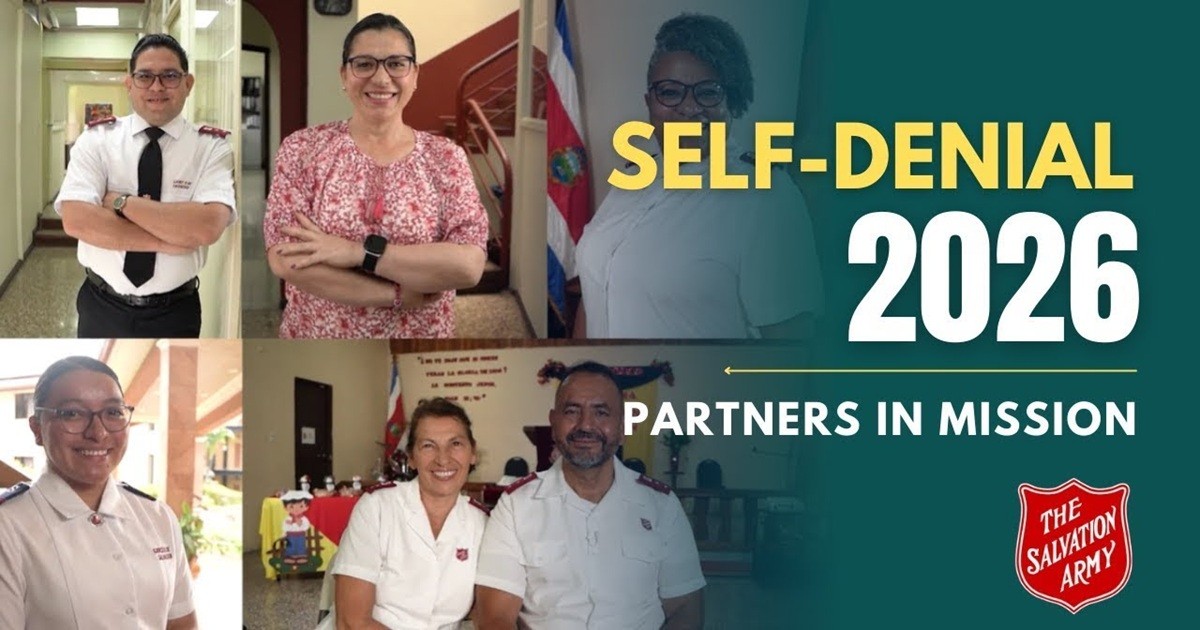I will never forget the day Major Helen Hastie came to talk to me and my husband, Rick, about Salvation Army officership. Before leaving, she pulled a VHS tape from her purse—some of you reading this may not even know what that is—entitled “A Proud Day in June,” referring to when Salvation Army officers are commissioned in the Canada and Bermuda Territory, and promised a follow-up visit to continue the conversation. At the time, we didn’t feel God calling us to officership, and certainly not to move away from home for formal training, but we were open to full-time ministry if an opportunity became available.
Major Hastie felt comfortable having that conversation because she had a relationship with us as members and leaders in her corps. Personal relationship and conversation remain vital to helping people explore their calling to ministry. However, in our ever-changing world, the paths we take to get to that place of calling and ministry have grown, and our territory recognizes the need to create new ways for people to explore and confirm a calling to full-time ministry.
Throughout our history, the Canada and Bermuda Territory has promoted different paths to officership and full-time service, such as field-based training and auxiliary-captaincy. These opportunities continue along with accredited, residential programs at the College for Officer Training. Increasingly, there is renewed interest in lay ministry opportunities and that, along with a decline in our active officer rolls, has prompted territorial leadership to seek a solution to the need for leadership by creating an alternative form of non-officer service.
The new auxiliary-lieutenant program offers a full-time, non-officer position for those considering spiritual leadership in The Salvation Army. It will benefit those who feel called to officership as an avenue to explore ministry, and it can also serve as an opportunity for Salvationists who are not certain they feel called to be an officer but think a short-term ministry opportunity may help. In either case, it is a means by which people can consider and confirm a calling to full-time ministry as an officer.
This program requires an initial three-year commitment to ministry, after which time the suitability for extending this term will be reassessed. The auxiliary lieutenant program is encouraged for Salvationists age 18 years and older, whether you are a young adult who has not committed to a career path and want to engage with the ministry and mission of the Army, or someone entering early retirement and wanting to use your experience and expertise in ministry.
The role of auxiliary-lieutenant is not a lesser or an “officer-lite” version of leadership, as it still requires the spiritual maturity of a committed believer in Christ and the spiritual leadership they will bring to this ministry. This necessitates the applicant has local, divisional and territorial leadership support, and careful vetting through the territorial candidates council.
Following acceptance, auxiliary-lieutenants will receive training and coaching in the field to orient them to the requirements and expectations of ministry. This will include instruction in Salvation Army systems, policies and processes, with an emphasis on pastoral ministry, theology and preaching. The development of an auxiliary-lieutenant’s spiritual leadership is of key importance and will be tailored to prior learning and experience. Auxiliary-lieutenants will also be required to complete the course, “Introduction to Officership,” offered through Booth University College. While the auxiliary lieutenant role is not a commissioned or ordained officer role, it will function like one in ministry responsibility, and the Booth course is designed to augment the understanding of those responsibilities.
I believe that at some point in our lives as Salvationists, we need to consider a call to serve God in full-time ministry. I hope and pray that as you read this, you might consider what it could look like for you to serve in a full-time, short-term capacity in our territory. If you have been waiting for an opportunity like this and feel God is calling you to something new, I encourage you to reach out to your corps officer and set up a time to chat more about ministry opportunities.
If you are an officer and have identified people in your corps who are suitable for spiritual ministry leadership, but haven’t outwardly expressed a calling, I encourage you to send them this article, with the following message: “I read this article and thought of you. I’d love to talk more about it.” You just might plant a seed like the one my corps officer did over coffee and a VHS tape.
Major Deana Zelinsky is an area commander in the Ontario Division and the territorial training and development officer.
Illustration: Intpro/iStock via Getty Images Plus
This story is from:
Major Hastie felt comfortable having that conversation because she had a relationship with us as members and leaders in her corps. Personal relationship and conversation remain vital to helping people explore their calling to ministry. However, in our ever-changing world, the paths we take to get to that place of calling and ministry have grown, and our territory recognizes the need to create new ways for people to explore and confirm a calling to full-time ministry.
Throughout our history, the Canada and Bermuda Territory has promoted different paths to officership and full-time service, such as field-based training and auxiliary-captaincy. These opportunities continue along with accredited, residential programs at the College for Officer Training. Increasingly, there is renewed interest in lay ministry opportunities and that, along with a decline in our active officer rolls, has prompted territorial leadership to seek a solution to the need for leadership by creating an alternative form of non-officer service.
The new auxiliary-lieutenant program offers a full-time, non-officer position for those considering spiritual leadership in The Salvation Army. It will benefit those who feel called to officership as an avenue to explore ministry, and it can also serve as an opportunity for Salvationists who are not certain they feel called to be an officer but think a short-term ministry opportunity may help. In either case, it is a means by which people can consider and confirm a calling to full-time ministry as an officer.
This program requires an initial three-year commitment to ministry, after which time the suitability for extending this term will be reassessed. The auxiliary lieutenant program is encouraged for Salvationists age 18 years and older, whether you are a young adult who has not committed to a career path and want to engage with the ministry and mission of the Army, or someone entering early retirement and wanting to use your experience and expertise in ministry.
The role of auxiliary-lieutenant is not a lesser or an “officer-lite” version of leadership, as it still requires the spiritual maturity of a committed believer in Christ and the spiritual leadership they will bring to this ministry. This necessitates the applicant has local, divisional and territorial leadership support, and careful vetting through the territorial candidates council.
Following acceptance, auxiliary-lieutenants will receive training and coaching in the field to orient them to the requirements and expectations of ministry. This will include instruction in Salvation Army systems, policies and processes, with an emphasis on pastoral ministry, theology and preaching. The development of an auxiliary-lieutenant’s spiritual leadership is of key importance and will be tailored to prior learning and experience. Auxiliary-lieutenants will also be required to complete the course, “Introduction to Officership,” offered through Booth University College. While the auxiliary lieutenant role is not a commissioned or ordained officer role, it will function like one in ministry responsibility, and the Booth course is designed to augment the understanding of those responsibilities.
I believe that at some point in our lives as Salvationists, we need to consider a call to serve God in full-time ministry. I hope and pray that as you read this, you might consider what it could look like for you to serve in a full-time, short-term capacity in our territory. If you have been waiting for an opportunity like this and feel God is calling you to something new, I encourage you to reach out to your corps officer and set up a time to chat more about ministry opportunities.
If you are an officer and have identified people in your corps who are suitable for spiritual ministry leadership, but haven’t outwardly expressed a calling, I encourage you to send them this article, with the following message: “I read this article and thought of you. I’d love to talk more about it.” You just might plant a seed like the one my corps officer did over coffee and a VHS tape.
Major Deana Zelinsky is an area commander in the Ontario Division and the territorial training and development officer.
Illustration: Intpro/iStock via Getty Images Plus
This story is from:










I wonder when the Army will open its doors to accepting outside clergy as leaders. We have lost over time many officers to other denominations and in the beginning of the Army we accepted outside clergy. Maybe its time to consider adopting those from other denominations to fill some vacancies. Something to discus.